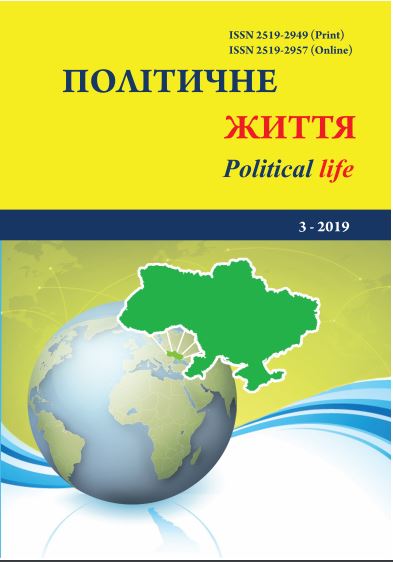Perspectives of the institutionalization of the elite in the processes of modernization of the political system of Ukraine.
DOI:
https://doi.org/10.31558/2519-2949.2019.3.20Keywords:
political elite, political system, political modernization, political institutionalization, political institute, political subjectivityAbstract
The dynamism of the development of modern political systems is due to the influence of global processes of informatization and globalization. They define new standards of society, aimed at increasing the level of stability and order as the basis of progressive socio-political development. The processes of political modernization are an effective mechanism for the practical implementation of qualitatively new changes related to the structural and content-based updating of political systems, the creation of opportunities for the development of a social and legal state and civil society. In the course of institutionalization, the political elite acquires stable structural and functional characteristics that determine the features of intra-age interaction, specify the procedure of political activity and technological tools necessary for optimization of the set goals and objectives. The high level of institutionalization in the political system allows the elite to demonstrate subjectivity in initiating and practical implementation of national modernization projects. The level of institutionalization of the elite, its subjectivity in the implementation of modernization transformations can be improved due to: 1) update of the staffing of the status-role grid by attracting the potential of youth leaders and conducting of lustration; 2) creation of conditions for forming a regime of partnership cooperation with civil society and business structures on the basis of mutual recognition of obligations and responsibilities regarding the modernization of the political system in the conditions of global development; 3) formation of an effective institutional environment that will increase the level of openness of intra-age interaction, optimize communication practices with civil society and provide sequences of procedural and technological aspects of the process of political modernization; 4) initiating a national modernization project that is in line with the current trend of global development; 5) activating the mobilization and consolidation potential of civil society through raising the level of national consciousness and political identity.References
Кульчицький С., Міщенко М. Україна на порозі об’єднаної Європи: монографія / кер. проекту Ю. Якименко Київ: Центр Разумкова, 2018. 232 с.
Луцишин Г. І. Національна консолідація України в умовах демократизації суспільства. Наукові праці Чорноморського державного університету імені Петра Могили. Сер. Політологія. 2012. Т. 182. Вип. 170. С. 51–55. URL: http://nbuv.gov.ua/UJRN /Npchdupol_2012_182_170_13 (дата звернення: 05.05.2019).
Матеріали круглого столу «Перспективи модернізації в Україні і тенденції змін суспільної свідомості» 11 лютого 2013 року. Київ : Інститут соціології НАН України. URL: http://dif.org.ua/article/20- rokiv-monitoringu1-zmini-u-suspilniy-svidomosti-naselen nya-ukraini (дата звернення: 21.04.2018).
Основні засади та шляхи формування спільної ідентичності громадян України. Інформаційноаналітичні матеріали до Круглого столу 12 квітня 2017 року. Київ: Центр Разумкова, 2017. 94 с.
Пірен М. І. Перезавантаження мислення політико-владної еліти України в процесі реалізації демократичного врядування. Вісник Національної академії державного управління при Президентові України. Серія: Державне управління. 2016. № 1. С. 126–131. URL: http://nbuv.gov.ua /UJRN/ vnaddy _2016_1_18 (дата звернення: 11.04.2018).

